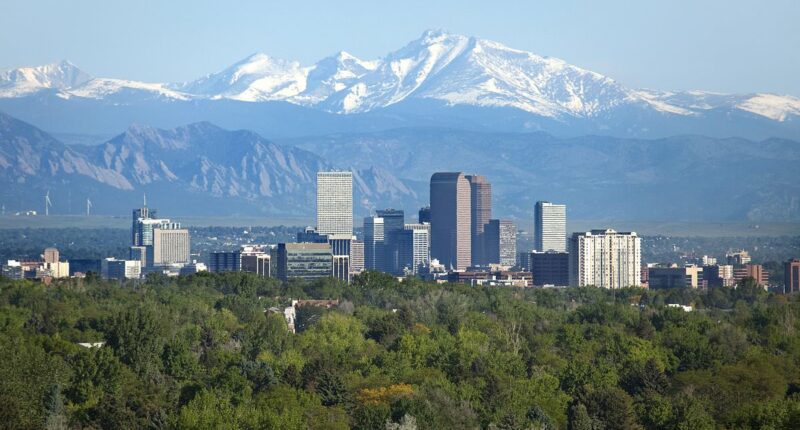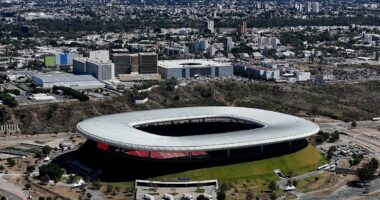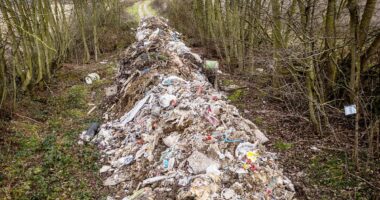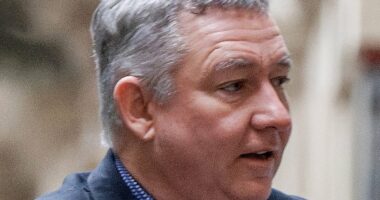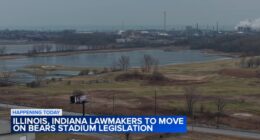Share this @internewscast.com
Bosses at one of America’s busiest airports have sparked fury by unveiling controversial plans to explore using nuclear energy.
Earlier this month, leaders at Denver International Airport in Colorado announced a new initiative, which instantly drew criticism from local residents who felt they weren’t adequately informed.
The airport has since been forced to pause its plans for a feasibility study following the outcry.
Councilwoman Stacie Gilmore, representing District 11, expressed that her community was not given a chance to discuss potential concerns regarding safety and nuclear waste.
“This topic was never mentioned,” Gilmore remarked to the Daily Mail. “Denver International Airport seems to be hastily moving forward without proper community engagement, and residents have voiced their objections.”
The airport intended to allocate up to $1.25 million for a study lasting six to twelve months. The study’s purpose was to assess the feasibility, risks, and costs of integrating nuclear power at the airport.
However, Gilmore pointed out that her constituents strongly oppose the idea. She emphasized that the proposed nuclear technology is relatively new and that its location would be near Denver’s most racially diverse communities.
“Communities of color should not be burdened with radioactive waste, especially when we lack proper storage solutions,” Gilmore stated.
She called Denver Airport CEO Phil Washington’s ‘rushed’ plan ‘half-baked’.
But more than that, she said the airport hasn’t reached out the community to hear their concerns, which include, the heightened risk for cancers, air and noise pollution, and radioactive chemicals being nearby, among others.

Denver International Airport has sparked fury after announcing it would conduct a study to evaluate relying on nuclear power

Stacie Gilmore, who represents District 11, said the bold new plan was never discussed with her constituents, who have questions about safety and nuclear waste
The study is now on pause while the city and airport talk to constituents. Normally, they said, they would do community outreach while the study was happening.
‘However, since it was requested, we are happy to do so,’ the airport said in a statement.
But Gilmore said that wasn’t enough and claimed the airport would never shell out so much on a study if it hadn’t already made up its mind.
‘The concerns of the community would be one page of that study. The rest of the study would be saying exactly how this is a great idea,’ she told Daily Mail.
‘If you’re raising your kids in a single neighborhood where you bought a single-family home and that is your greatest asset of your family, do you want your grandparents’ home located next to a small nuclear reactor?
‘And god forbid something catastrophic happens out there, it will mean people’s lives,’ she continued. ‘It doesn’t jive with Denver’s values. Phil Washington is so greedy.’
She said the communities that would be affected by this have been ‘systematically ignored’ and she’s ‘not willing to play with people’s lives’.

Gilmore called Denver Airport CEO Phil Washington’s (pictured) ‘rushed’ plan ‘half-baked’

Mayor Mike Johnston (pictured) is in full support of the study, which has been paused amid a backlash

Denver is the third busiest airport in the US and the sixth worldwide. It handles 80million passengers a year and is estimated to see more than 120million by 2045
‘This is brand new technology that nobody really knows long-term issues with,’ she told Daily Mail. ‘That’s irresponsible.’
Denver is the third busiest airport in the US and the sixth worldwide. It handles 80million passengers a year and is estimated to see more than 120million by 2045.
The city is hoping to find a more sustainable way to generate electricity to become ‘energy independent’ and to have the ‘greenest airport in the world,’ a press release stated.
‘Denver leads with bold ideas, and our vision for the future of our airport is no exception,’ Mayor Mike Johnston said in a statement.
‘We must explore every innovative solution available to meet the demands of a growing city and a changing climate.’
Mayor Johnston and Denver Airport did not return Daily Mail’s request for comment.
Nuclear power is a growing energy field as it has low greenhouse gas emission, while still generating electricity.
Those that use small reactors can also add more as the demand for energy grows and have a smaller carbon footprint than a bigger reactor.

The city is hoping to find a more sustainable way to generate electricity to become ‘energy independent’ (Pictured: small nuclear reactor in Clinton, Illinois)
However, small reactors are still in the development stage in the US and it could be up to a decade before operations begin.
Another drawback to nuclear power is that waste is stored on site as the US does not have a national disposal site.
The US, however, is the world’s largest producer of nuclear power, accounting for roughly 30 percent.
The Donald Trump Administration set a target to quadruple the US’ capacity by 2050.
The majority of nuclear reactors are on the Eastern side of the country.
